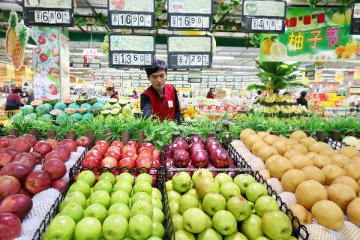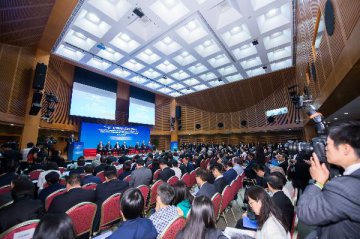
Chinese President Xi Jinping's ongoing visit to Kazakhstan has won growing support for the Belt and Road Initiative and a historic enlargement of the Shanghai Cooperation Organization (SCO).
Xi arrived here Wednesday for a state visit to Kazakhstan, the 17th meeting of the SCO Council of Heads of State and the opening ceremony of the Expo 2017 Astana.
Speaking to reporters after the SCO annual summit on Friday, Chinese Assistant Foreign Minister Li Huilai said the fruitful results of the summit will help SCO member states to address threats and challenges, and are important for them to achieve development and revitalization.
UPGRADING BELT AND ROAD BUILDING
The Belt and Road Initiative, first proposed by Xi in 2013 in Kazakhstan, comprises the Silk Road Economic Belt and the 21st Century Maritime Silk Road, with the aim of building a trade and infrastructure network connecting Asia with Europe and Africa along the ancient trade routes.
Four years later, when Xi returned to Astana, the initiative has developed from a proposal to actions, and from a concept to practice, generating business opportunities, new jobs and hopes for countries and peoples involved.
The Chinese president and leaders attending the SCO summit have pledged to carry out extensive cooperation under the Belt and Road framework, further align their respective development strategies, pooling each other's resources and sharing economic and social benefits.
In a press communique released after the summit, leaders of the SCO countries spoke highly of the Belt and Road Forum for International Cooperation held by China in Beijing on May 14 to 15, saying that they stand ready to jointly implement the forum's consensus.
During a meeting with Spanish King Felipe VI on Friday, Xi said that China welcomes Spain's participation in the building of the Belt and Road Initiative, adding that they should make full use of the China-Europe freight train from the eastern Chinese city of Yiwu to the Spanish capital of Madrid.
China and Tajikistan are also mulling more high-end, innovative and diversified cooperation within the Belt and Road Initiative. The expanding and evolving of the initiative "demonstrated the openness and inclusiveness China has advocated," said Wang Yiwei, Director of Institute of International Affairs at Renmin University of China.
"The Belt and Road (Initiative) essentially answers the call of the mankind for development. It is the need of most countries in the world, where supply capacity is far from enough to meet the growing need for public goods," Wang said.
NEW BLOOD FOR BROADER SCO ROLE
The SCO accepted India and Pakistan as its full members on Friday in its first expansion since its founding in 2001, making it the world's most populous regional cooperative organization and the largest by area.
The founding members of the SCO are China, Russia, Kazakhstan, Kyrgyzstan, Tajikistan and Uzbekistan. Welcoming the new members, Xi called on the SCO to "carry forward the fine tradition of solidarity and coordination."
"All member states, old and new, should work in close coordination, deepen mutual trust and increase mutual support in their endeavor to build a community of shared future featuring equality, mutual support, solidarity and sharing of weal and woe," Xi said while addressing the annual gathering of the SCO heads of state.
The Chinese president, along with other SCO leaders, signed seven resolutions including a joint declaration, a press communique, a statement on jointly combating international terrorism and a treaty on anti-extremism.
Besides the historic enlargement of the SCO, Li said the summit also decided to carry forward the "Shanghai Spirit" featuring mutual trust, mutual benefit, equality, consultation, respect for diverse civilizations and pursuit of common development.
Summing up the achievements of the summit, the Chinese assistant foreign minister noted that the SCO members vowed to promote a more just and equitable international order and build a community of shared future for mankind.
By sticking to the "Shanghai Spirit" and taking solid steps in building a community of shared future, the SCO has set up a new type of international relations featuring win-win cooperation, said Xi.
China took over the rotating chair of the SCO after the Astana summit concluded on Friday and will host its next summit in June 2018.
Xi said China will contribute an additional 10 million yuan (1.47 million U.S. dollars) to the SCO Secretariat to facilitate its work, and proposed setting up a media cooperation mechanism among the SCO member states, saying China would like to host the first SCO media summit.
On security issues, the Chinese president said the SCO should continue to give priority to maintaining regional security and stability, calling for an outline of cooperation plan on combating terrorism, extremism and separatism known as the "three evil forces" for the next three years.
He also proposed that the SCO draw up a five-year outline for implementation of the Treaty on Long-term Good Neighborliness, Friendship and Cooperation.
FLOURISHING CHINA-KAZAKHSTAN TIES Kazakh
President Nursultan Nazarbayev warmly welcomed Xi for his third visit to the Central Asian country, saying his visit, on the occasion of the 25th anniversary of the establishment of diplomatic ties between China and Kazakhstan, will greatly facilitate the development of their comprehensive strategic partnership.
Noting that the political mutual trust has reached an unprecedented height, Xi said China is willing to build "a stronger community of shared interests and shared future" with Kazakhstan, and hopes the two countries can be "good neighbors, friends and partners forever."
China ranks among Kazakhstan's top trading partners and investors. Chinese investment in Kazakhstan amounted to over 42.8 billion U.S. dollars, while two-way trade of the first four months of 2017 surged by 45.6 percent.
During their talks on Thursday, Xi and Nazarbayev agreed to further integrate the China-proposed Belt and Road Initiative and Kazakhstan's development strategy of "Nurly Zhol," or "Bright Path" in the Kazakh language.
To showcase the Belt and Road cooperation achievements between the two countries, the two heads of state inspected via videolink the logistic center in China's eastern city of Lianyungang and a dry port in Horgos, a city of China's Xinjiang Uygur Autonomous Region bordering Kazakhstan. Both cities are key hubs of the Europe-bound China Railway Express and the New Eurasian Land Bridge.
During their talks, Xi and Nazarbayev agreed that the two countries will focus on aligning the New Eurasian Land Bridge and the construction of an economic corridor linking China, Central Asia and West Asia, with the Kazakh strategy of building an international logistics corridor.
They will also join efforts in connecting the international production capacity cooperation with Kazakhstan's push for industrialization, sharing China's transportation advantages on land and by sea with the world's biggest landlocked country, and linking China's "digital Silk Road" initiative with the "digital Kazakhstan" strategy.
Accompanied by Nazarbayev, Xi visited the China Pavilion at the Expo 2017 Astana, which bears the theme "future energy," on Thursday afternoon.
Xi's presence at the opening ceremony of the Expo demonstrated China's full support to Kazakhstan, according to Li.
In a move to further expand China-Kazakhstan people-to-people and cultural exchanges, a movie telling the life story of the late Chinese composer Xian Xinghai in Kazakhstan in 1940s, which was inspired by Xi's speech, started shooting here on Thursday.





















Latest comments